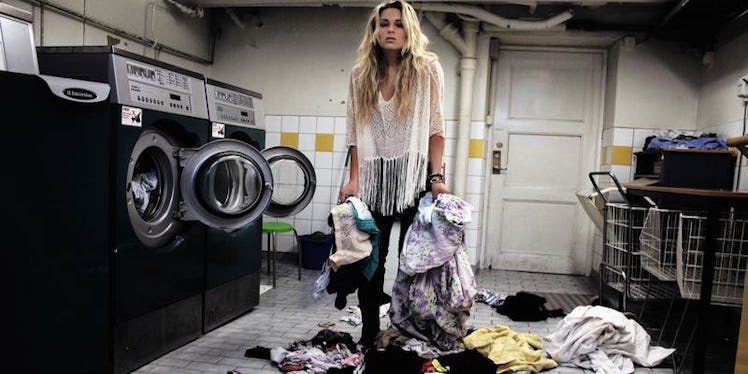We live in a very formulaic and predictable world. Almost everything is neatly packaged and systematized. Society perpetually seeks to maintain order, in every sense of the word.
But it's all an illusion.
We have been taught to value superficial notions of symmetry.
Organization is a comfort pillow that lies to us and tells us life isn't really the random, chaotic mess we secretly know it to be.
In our attempts to establish order, we often create disorder. When we buy new clothes or shoes to appear put together in public, for example, our closets begin to overflow.
When we throw away trash, it goes to a landfill and contributes to pollution.
As physicist Adam Frank states:
It's a law of physics. The hard truth is that the universe itself is dead-set against our long-term efforts to bring order to the chaos in our lives. That's because the universe loves chaos.
Indeed, no matter how hard we try to keep things neat and tidy, everything will always fall back into disarray.
We should say "yes" to the mess more often and embrace the chaotic nature of the universe.
Messy people are often stigmatized as apathetic and imbalanced individuals, but that's simply not true.
Disorganized people have seen the light. They won't allow their lives to be dictated by propriety and convention.
To borrow from Jim Morrison:
I am interested in anything about revolt, disorder, chaos... It seems to me to be the road toward freedom.
This is not to say we should allow every aspect of our lives to fall into complete havoc. Organization can be necessary, convenient and even beautiful. But it's also overrated, and those who live in clutter are often unfairly judged.
Messy people aren't lazy, they're actually very imaginative and bold.
Conventional wisdom might tell us we need order to foster productivity, but this isn't necessarily true.
According to Eric Abrahamson and David H. Freedman, authors of "A Perfect Mess: The Hidden Benefits of Disorder,"
Mess isn't necessarily the absence of order. A messy desk can be a highly effective prioritizing and accessing system. On a messy desk, the more important, urgent work tends to stay close by and near the top of the clutter, while the safely ignorable stuff tends to get buried to the bottom or near the back, which makes perfect sense.
In other words, a messy desk can actually help boost efficiency, depending on the person.
Correspondingly, research conducted by Kathleen Vohs, PhD, of the University of Minnesota Carlson School of Management, found that cluttered environments help induce greater levels of creativity.
In one of the experiments conducted for this study, Vohs split up a group of 48 participants and asked them to find new ways to utilize a ping pong ball. One half was placed in a tidy room, the other half in a messy room.
In the end, both groups came up with the same number of ideas, but the ideas produced by those in the untidy room were determined far more innovative by a panel of independent judges.
As Vohs puts it:
Being in a messy room led to something that firms, industries and societies want more of: creativity. Disorderly environments seem to inspire breaking free of tradition, which can produce fresh insights. Orderly environments, in contrast, encourage convention and playing it safe.
This doesn't come as much of a surprise; disorganization has often been associated with genius. Many famous thinkers and writers have worked in extremely messy environments, from Albert Einstein and Alan Turing to Roald Dahl and JK Rowling.
They all achieved greatness in spite of their messiness.
From a young age, we are taught to feel bad about ourselves for being messy. Disorganized or unkempt people are frequently maligned by society. In the process, the hidden benefits of this quality are overlooked.
It takes courage to embrace disorder, as it often requires accepting constant criticism and going against social constructs.
People who live in clutter are inherently spontaneous. They'd rather worry about the big picture than all of the minuscule details of day-to-day life. They go with the flow instead of swimming against the current.
Simply put, messy people are adventurous and adaptable. They're pioneers who are more concerned with filling the limited amount of time allotted to them with meaningful tasks rather than tedious activities like cleaning.
There is simplicity and beauty in living a messy life, which is precisely why it produces such enlightened and innovative individuals.
Life is a disheveled, unpredictable and wondrous gift. Act accordingly, and enjoy the ride.
Citations: A messy desk encourages a creative mind study finds (APA), Tidy Desk or Messy Desk Each Has Its Benefits (APS), Is a messy desk a good thing (CNN), Dont Try To Clean That Messy Desk (NPR)
